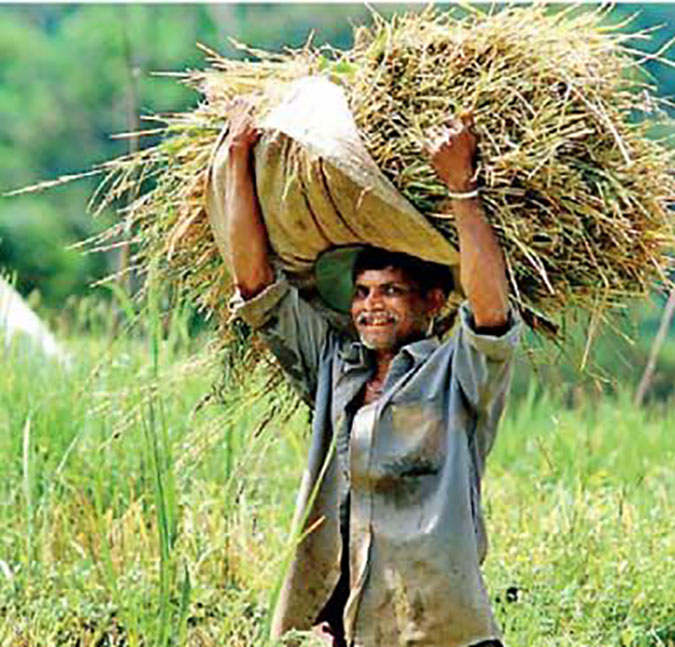Business
Releasing of State Bank funds to purchase paddy left in limbo

Agriculture Ministry Secretary keeping his fingers crossed until next Board Meeting at BOC
Farmers say private rice-millers buy paddy at lower prices and sell rice at higher prices
by Sanath Nanayakkare
M.B. Rohana Pushpakumara, Secretary to the Ministry of Agriculture told the media on Saturday that the Cabinet had approved a bank facility of Rs. 2000 million from State Banks to purchase Yala Season’s paddy harvest from the farmers, which decision had been subsequently informed to the Banks by the Ministry of Finance, but nevertheless these funds have still not been released to the Paddy Marketing Board (PMB).
“The Cabinet of ministers had given the approval to get a credit facility of Rs. 2,000 million from the Bank of Ceylon and the People’s Bank to purchase the paddy harvest of the Yala season. Accordingly, the Finance Ministry had informed the Banks to release these funds to the PMB. In this backdrop, we started purchasing paddy from farmers immediately, assuming that we would get those funds. But we have still not received Cabinet-approved funds from the Banks, “he said.
“After the directives, we bought paddy to the value of Rs. 850 which was actually bought on credit. Over the past few weeks, we settled 90% of these credit purchases with funds of the PMB. However, we continue to negotiate with the Bank of Ceylon (BOC) to obtain the credit facility soon. What we hear by today is that the BOC is going to hold a Board Meeting by 2nd October, and a decision would be made at it to release the funds. If that happens, we can resume purchasing of paddy which has come to a halt due to lack of funds,” he said.
Meanwhile, farmers told the media that although harvesting of Yala Season’s paddy has started, the government warehouses are not purchasing their yield, and therefore, farmers can’t sell their yield at a competitive price.
“Government’s paddy purchasing centres must be opened as quickly as possible to prevent private rice millers from buying paddy from us at low prices,” they said.
” If we can sell a kilo of paddy at Rs. 150, that will be sufficient for us to cover our expenses and have a fair profit margin. But now we are compelled to sell at Rs. 96-110. That is not enough to cover even the cost of production. A big warehouse in Polonnaruwa has put up a sign as a ‘paddy purchasing centre’, but it remains closed. If the government starts purchasing paddy, then only private millers will start offering competitive prices. What happens now is they buy paddy at lower prices and sell rice at a higher price. If they buy low and sell low, that’s fine. But they are doing it the other way round.”
A farmer association told the media that this situation could lead to a hunger crisis. They, however, said that officials at the Ministry of Agriculture pledged to resolve the issue within a month’s time. They warned that if a solution is not found to the issue within the timeline, farmers and all the people that consume rice as their staple food would take to the streets to launch an Aragalaya.
However, credible news reports earlier this month said that the government was going to mortgage its paddy stocks to state-run banks to obtain required cash to make purchases from farmers in the current season. The move came after the state-run banks declared they were not in a position to extend loans to the state-run PMB to buy paddy as the debt on previous loans amounting to nearly Rs. two billion was still outstanding.
Business
Ceylon Tea conquers Libya: Exports leap 416%

In a world where every strong cuppa tells a unique story, Sri Lanka’s famed Ceylon Tea continues to carve its legacy – one cup at a time. The latest tea export figures for March 2025 reveal a tale of resilience, with total shipments rising to 23.43 million kilograms, up from 21.25 million kgs the previous year.
But the real headline is; Libya’s staggering 416% surge in Ceylon Tea imports – marking a bold new chapter in Sri Lanka’s tea trade. While traditional markets like Iraq and Russia held steady, Libya emerged as the ‘breakout star’, importing 5.31 million kgs in the first quarter of 2025 – a jaw-dropping leap from just 1.03 million kgs in 2024.
This explosive growth signals a burgeoning demand for Sri Lanka’s premium leaves in North Africa, where the rich, aromatic flavors of Ceylon Tea are winning hearts and palates.
Quadrupling Libya’s appetite for Ceylon Tea even in challenging global markets, is reflecting the fact that Sri Lanka’s tea can find loyal fans in evolving markets.
However, while the export values shine in USD terms, the rupee value of tea exports dipped slightly – a stark reminder of currency fluctuations impacting export earnings. Yet, the broader trend remains positive for Ceylon Tea, with cumulative exports for Q1 2025 reaching 63.21 million kgs, up from 62.33 million kgs last year.
Key markets like Iraq (+7%) and Chile (+41%) showed strong growth, while Russia and the UAE saw mild declines. Meanwhile, Tea Bags and Instant Tea have posted gains even in rupee terms – marking a bright spot in an otherwise mixed landscape, where Tea in Bulk and Green Tea segments have witnessed a decline against the same period of the previous year.
On the production front, tea production for the month of March 2025 totalled 24.43 M/Kgs, showing an increase of 4.86 M/Kgs vis-à-vis 19.57 M/Kgs of March 2024. All elevations showed an increase in comparison with the corresponding month of 2024.
“As Sri Lanka’s tea industry navigates global headwinds, the increase in production and Libya’s soaring demand could offer a breather,” analysts said.
(Source: Forbes & Walker Pvt Ltd, Sri Lanka Customs, Central Bank of Sri Lanka)
By Sanath Nanayakkare
Photo Credit: Sri Lanka Executive Aviation Services
Business
Fits Retail and Abans unveil exclusive DeLonghi Premium Coffee experience

In a groundbreaking collaboration set to transform Sri Lanka’s premium coffee landscape, Fits Retail has partnered with retail giant Abans PLC to showcase the iconic DeLonghi coffee machines at two of Colombo’s most prestigious locations: Abans Elite Colombo 3 and Abans Havelock City Mall showrooms.
This exclusive partnership presents a rare opportunity for coffee aficionados to experience firsthand why DeLonghi has become synonymous with coffee perfection worldwide.
With a heritage spanning over 100 years, DeLonghi proudly holds the title as the number one coffee machine brand in more than 46 countries, celebrated globally for its exceptional quality, innovation, and unrivaled Italian craftsmanship. Fits Retail’s collaboration with Abans PLC brings these legendary machines directly to Sri Lankan coffee enthusiasts, creating immersive experience zones designed to elevate everyday coffee moments into extraordinary rituals.
At these dedicated demonstration zones, visitors can discover the unparalleled precision engineering and user-friendly technology that have made DeLonghi machines the preferred choice for discerning coffee lovers in more than 46 countries worldwide.
Business
Ceyline Group and Lion Brewery Forge a Sustainable Future with Eco-Friendly Warehousing and Distribution.

Ceyline Total Solutions, the end-to-end logistic solutions provider of Sri Lanka’s leading maritime and logistics group Ceyline, has built Lion Brewery’s first sustainability-focused warehousing and distribution center in just 100 days.
Located in Tangalle, the facility reflects a strong commitment to environmental responsibility. Half of the structure is made from repurposed shipping containers, reducing both waste and carbon emissions. The project, executed by Ceyline’s brand for sustainable living spaces “Out of the Box” features interior fittings made from recycled and reused brewery waste materials, maximizing sustainability and cost efficiency. Ceyline also has already applied for CEB approval to install solar power for the facility to ensure its operation is powered by clean and green energy.
Lion Brewery will further its mission for an efficient and eco-friendly supply chain by incorporating elements such as electric forklifts, rainwater harvesting, and energy-efficient lighting.
This collaboration not only delivers a pioneering green logistics facility but also sets a new benchmark for sustainable warehousing in Sri Lanka. It showcases the power of collaborative innovation in driving responsible industrial development.
Kaveen Gayathma, Senior Vice President (Outbound Logistics) of Lion Brewery, added, “This project further strengthens our distinctive ‘route-to-market’ approach. Our collective efforts in conceptualizing,
drafting, and crafting have culminated in the creation of a truly one-of-a-kind model. The company’s unwavering commitment to environmental stewardship and sustainability is clearly demonstrated here, all while achieving our strategic objectives in a practical and cost-effective manner.”
-

 Business7 days ago
Business7 days agoDIMO pioneers major fleet expansion with Tata SIGNA Prime Movers for ILM
-

 News6 days ago
News6 days agoFamily discovers rare species thought to be extinct for over a century in home garden
-

 Features4 days ago
Features4 days agoRuGoesWild: Taking science into the wild — and into the hearts of Sri Lankans
-

 Foreign News7 days ago
Foreign News7 days agoChina races robots against humans in Beijing half marathon
-

 Editorial7 days ago
Editorial7 days agoSelective use of PTA
-

 News4 days ago
News4 days agoOrders under the provisions of the Prevention of Corruptions Act No. 9 of 2023 for concurrence of parliament
-

 Features5 days ago
Features5 days agoNew species of Bronzeback snake, discovered in Sri Lanka
-

 Features6 days ago
Features6 days agoThe ironies of history




















